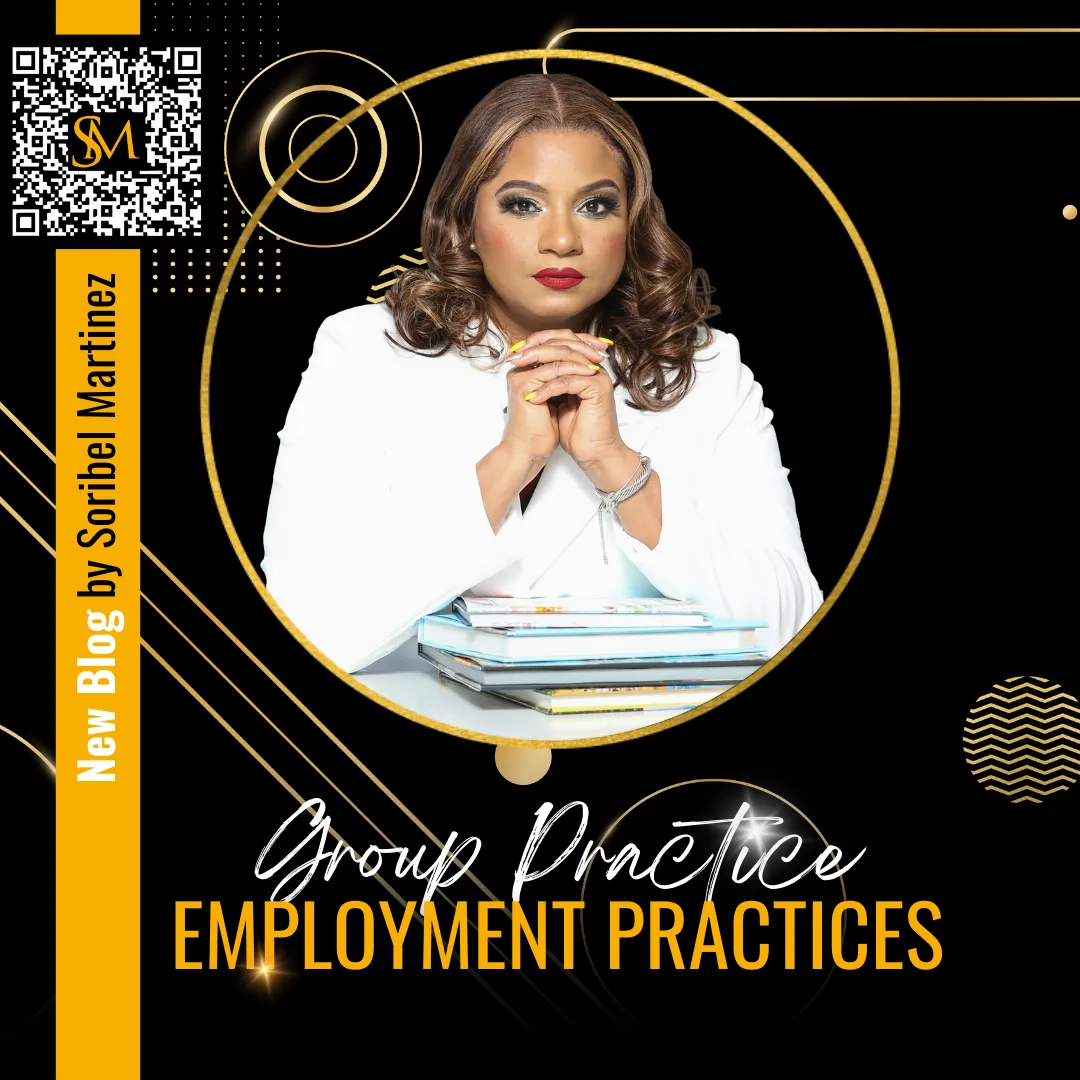Group Therapy Practice Employment Practices
Owning and managing a group practice comes with a unique set of considerations. Referrals, social media, continuing education, telehealth options, and malpractice insurance provide for a wide range of items needing attention.
However, the life-giving force of any organization is the people you employ. To ensure your practice’s smooth and legal operation, you need to pay close attention to employment law and human resources.
Therefore, in this blog, we will explore employment practices for group practice owners that are vital to a thriving business, including the following:
- An Employment Attorney’s Role in a Group Practice
- Payroll Procedures in Your Group Practice
- Human Resources in Your Group Practice
- Employee Relations in Your Group Practice
- The Next Steps Toward Your Success in Group Therapy Practice
With these practices, you can run your business effectively and draw top-notch talent to your employment.
An Employment Attorney’s Role in a Group Mental Health Practice

The role of an employment attorney in a group therapy practice is critical in ensuring legal compliance, protecting the rights of both employees and employers, and maintaining a successful and lawful work environment. Here is how an employment attorney can have a substantial effect on your group practice management:
- Legal Compliance: Employment attorneys help group mental health practice owners understand and comply with federal, state, and local labor laws and regulations. This includes laws related to minimum wage, overtime, and working hours, which are particularly important if employees work variable schedules in mental health settings.
- Employee Contracts and Agreements: They assist in drafting, reviewing, and updating employment contracts and agreements, ensuring that terms and conditions are legally sound and protect the interests of both the practice and its employees.
- Anti-Discrimination and Harassment: Employment attorneys can help create anti-discrimination and harassment policies that comply with applicable laws and regulations. These policies are especially crucial in mental health practices where sensitive patient information is often involved.
- Terminations and Disputes: They guide the proper procedures for employee terminations and assist in handling disputes, such as wrongful termination claims.
- Wage and Hour Issues: Employment attorneys ensure that the practice complies with wage and hour laws, especially important when dealing with hourly employees, part-time workers, or those on unique schedules.
- Employee Handbook: They assist in creating and regularly updating the employee handbook to reflect changes in laws and policies, setting clear expectations for employees regarding conduct and workplace rules.
- Employment Litigation: In the event of employment-related disputes or lawsuits, an employment attorney will provide legal advice and represent the practice’s interests in court, arbitration, or settlement negotiations.
- Confidentiality and Privacy: In mental health practices, adherence to the Health Insurance Portability and Accountability Act (HIPAA) is paramount. Employment attorneys help ensure employee actions and policies align with HIPAA regulations to protect patient confidentiality.
- Contract Negotiations: When hiring mental health providers, an employment attorney can help negotiate their contracts, ensuring that terms regarding patient care, billing, and non-compete clauses are legally sound.
Payroll Procedures in Your Group Practice
Payroll management in a group practice is critical to running the business efficiently and complying with various labor and tax regulations. Ensuring that employees are paid accurately and on time is essential for employee satisfaction and the overall success of the practice.
Payroll companies are a way of putting this vital area of your business in professional hands. With all the considerations involved in payroll, mistakes are possible and costly. The following are key considerations for managing payroll in your practice:
- Employee Classification: Determine whether your employees are classified as exempt (salaried) or non-exempt (hourly). Mental health group practices may have a mix of both, and understanding the distinction is crucial for compliance with wage and hour laws.
- Hourly Tracking: For non-exempt employees, implement an accurate system for tracking work hours, including overtime, if applicable. This is especially important in practices where staff members have variable schedules or work overtime to meet patient needs.
- Payroll Software: Invest in reliable payroll software or consider outsourcing payroll services. Modern payroll systems can automate calculations, tax withholdings, and direct deposits, reducing the risk of errors.
- Tax Withholding: Ensure that you withhold the correct amount of federal and state income taxes, as well as Social Security and Medicare taxes, from employee paychecks. Payroll software can help with accurate tax calculations.
- Benefit Deductions: If your practice offers employee benefits such as health insurance or retirement plans, set up payroll deductions accurately and manage contributions to these plans.
- Overtime Management: Pay careful attention to overtime rules, as healthcare workers, including mental health professionals, may be subject to specific labor laws governing overtime pay. Make sure you’re compliant with these regulations.
- Payroll Frequency: Determine the frequency of payroll processing (e.g., weekly, biweekly, or monthly) and communicate this clearly to employees. Consistency in pay dates is essential for employee financial planning.
- Employee Records: Maintain accurate records of employee information, including personal details, tax forms (W-4s), and benefits enrollment forms. This information is essential for payroll processing and tax reporting.
- Payroll Taxes: Submit payroll taxes to the appropriate government agencies on time. Failure to do so can result in penalties and legal issues. Payroll software can help automate tax filings.
- Record-keeping and Reporting: Keep detailed records of each payroll cycle, including pay stubs and payroll reports. This documentation is valuable for audits and compliance checks.
- Compliance with Employment Laws: Stay up to date with federal, state, and local labor laws, as well as any industry-specific regulations that may apply to mental health practices.
- Budgeting and Forecasting: Use payroll data to help with budgeting and forecasting expenses. This can aid in financial planning and decision-making for the practice.
When dealing with all these details, it is easy to make a mistake, creating enormous headaches for yourself and your employees. A basic understanding of all the aspects of your business is good to have. Still, leave the day-to-day details in the hands of professionals. Using the services of a payroll company can keep all of these considerations in check.
(HR) in Your Group Therapy Practice

You want quality employees who are thriving in their jobs and happy to stay in your practice. To accomplish this, strong human resource practices are a must. Here are some areas in which your HR practice needs to shine.
- Recruitment and Onboarding: Develop a structured recruitment and onboarding process to attract and retain top talent. HR professionals can help with job postings, interviewing, reference checks, and creating a smooth onboarding experience for new clinicians, independent contractors, and full-time and part-time employees.
- Performance Management: Implement a performance appraisal system to evaluate and provide feedback to employees regularly. HR can assist in setting performance goals and addressing performance issues.
- Conflict Resolution: HR professionals play a crucial role in resolving conflicts among employees and between employees and management. Having a clear conflict resolution policy in place is essential.
- Training and Development: Invest in the professional development of your staff to enhance their skills and job satisfaction. It is the job of HR to help identify training needs and facilitate relevant programs.
Employee Relations in Your Group Practice
Closely related to the discussion of human resources is the area of employee relations. This involves concern for staffing, training programs, and employee well-being. It is more than a procedure. It is a conversation. It is how you and your employees communicate to keep your workplace environment healthy and thriving. Keep a close watch on the falling areas:
- Workplace Culture: Foster a positive workplace culture that promotes open communication and in-person or virtual collaboration among employees.
- Reporting Procedures: Develop policies and procedures for addressing grievances, harassment, and discrimination and ensure employees feel comfortable reporting issues.
- Evaluation and Improvement: Regularly assess your group practice’s processes and policies to identify areas for improvement.
- Employee Feedback: Seek employee feedback to gauge their satisfaction and make necessary adjustments.
- Employee Benefits: A method of fostering strong employee relations is to consider offering competitive benefits packages. These include health insurance, retirement plans, paid time off, and wellness programs. Consider consulting with benefits specialists to explore insurance companies to design cost-effective and attractive employee benefits packages.








